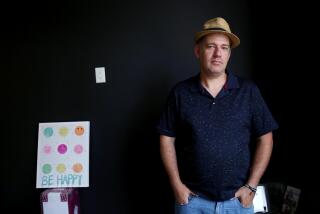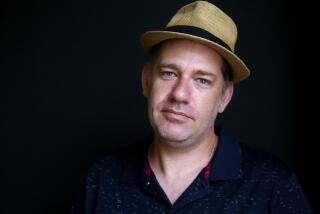Lenders Claim Man With the Midas Touch Stole Millions
- Share via
Available: seven apartment houses containing more than 1,600 units ripe for quick conversion to condominiums.
Terms: reasonable. No down payment necessary. Will provide cash to cover all closing costs, plus first year’s mortgage payments.
It may sound too good to be true, but that’s the deal that jilted creditors claim that Robert Buceta cut for himself in financing the purchase of residential real estate worth tens of millions of dollars from Southern California to Florida.
After Buceta defaulted on the loans, a federal grand jury in Los Angeles found another way to describe his Midas touch in real estate: too good to be legal.
Prosecutors allege that little, if any, work was done to carry out the condominium conversion plans. Those lenders who were willing to talk about their dealings with Buceta claim that they have been left holding the bag for a minimum of $28 million in unpaid loans.
Not Guilty Pleas
Buceta and his wife, Patricia L. Thibault, have pleaded not guilty to a federal indictment charging them with fraud and conspiracy in what U.S. Atty. Robert C. Bonner has called “one of the largest and most far-reaching fraud schemes ever perpetrated in Southern California.”
The couple could face a maximum of 142 years in prison if convicted on all counts.
Last week, Buceta hired noted criminal attorney Howard L. Weitzman to represent him in the case. Weitzman, who defended auto maker John Z. DeLorean in the trial that resulted in DeLorean’s acquittal on drug-trafficking charges, could not be reached for comment.
Buceta’s brother-in-law, Los Angeles attorney Richard G. Reinjohn, said the Bucetas’ dealings are simply business ventures gone sour.
“It’s as simple as this: If these projects all had gone forward, nobody would have said a word,” he said. “They didn’t, and everybody looks for a scapegoat. Here’s the scapegoat.”
Target of Numerous Lawsuits
Buceta, 39, has lived and worked in Newport Beach for years and has been the target of numerous lawsuits by those who lent him money or extended him credit.
Buceta and his wife have repeatedly declined to be interviewed. But interviews with dozens of people familiar with their financial dealings, as well as a review of claims in court cases on file, provide a picture of a one-time real estate prodigy whose reach far exceeded his grasp.
A native of Argentina, Buceta began as a relatively low-profile Los Angeles real estate agent and broker, according to lawyers who have looked into his background. He was 35 when he first began putting together the deals that would make, and ultimately break, him.
One former business associate remembers that Buceta worked out of the posh offices of Capital Properties, in which he and his wife served as general partners, at 4400 MacArthur Blvd. in Newport Beach.
On a desk, Buceta kept a large Bible. His religion--Buceta described himself as a born-again Christian--was openly espoused, and his religious sentiments pervaded his business dealings, a former associate said.
“He would say a little prayer at the beginning of a business meeting, and he would cite a verse at the end,” said the former associate, who agreed to an interview on the condition that his identify would not be disclosed.
The Bucetas have one child, a 5-year-old daughter, and they remodeled a large room in the executive suite for her use.
Nursery in Office
“They converted one of the rooms into a nursery for their brand new baby,” said the former associate.” They had Jungle Gyms, all sorts of equipment and everything. And they had a nurse who was there all the time.”
From that unorthodox command post, Buceta persuaded thrifts and other financial institutions as far away as Texas to help him buy property, according to court documents. His forte was acquiring apartment complexes for conversion to more valuable condominiums.
Working with real estate agents, brokers and mortgage bankers, Buceta collected a list of apartment properties that, in theory at least, could quickly be converted.
The Bucetas appear to have been wildly successful in persuading others to trust them with money.
In February, 1983, Buceta closed escrow on the purchase of a 102-unit complex in Escondido called Rock Springs, according to court documents. The deal was financed by a $4.5-million loan from State Savings of Stockton, now American Savings and Loan of Irvine.
$12.9 Million in Loans
Five months later, Buceta was the new owner of Ginger Cove, in Tampa, Fla., with 288 units, the indictment against them says. The purchase was financed by a series of loans totaling $12.9 million, also from State Savings of Stockton.
And between Nov. 8 and Dec. 30, 1983, he and his wife closed escrow on five major purchases, court documents show. In seven weeks, they had added 1,021 units in Colorado, Texas and Florida to their holdings.
More than $43.6 million in loans financed those purchases. The Bucetas, according to the indictment, were the proud owners of a mini-empire in real estate--owing almost $62 million in loans on what appeared to be $85.5 million worth of property.
They had done it all without having to pay a penny in down payments, according to the indictment.
Serious Problems Noted
Within six months, by mid-1984, some lenders realized that there were serious problems developing with Buceta’s deals, but it was some time before private lenders and government investigators concluded that Buceta’s defaults were not just bad business.
The Bible-quoting wheeler-dealer had set up sham escrow transactions, using fraudulently inflated appraisals, misrepresented that the loan proceeds would be used to renovate the properties and lied about his financial status and tax returns in applying for the loans, according to the indictment.
At the heart of the alleged scam was what lawyers call “the flip.”
A double escrow is used to pull it off. The property in question changed hands twice at the same time, with the first purchase at fair market value and the second at a much higher price. On the same day, Buceta would allegedly buy the property through a corporation that he controlled and then sell it to himself, often at nearly double the price of the first transaction.
How Alleged Deal Worked
The victim in such a scheme is the financial institution that lends money based on the second selling price, believing that is the true value of the property. The first purchase and the fact that Buceta controlled the entity from which he bought the property were concealed from the lenders, according to the indictment.
Also lending apparent legitimacy to the deals, court documents show, were appraisals submitted for the secondary transactions, the sales from the corporations controlled by Buceta to him personally. Instead of a single appraisal for an apartment complex that was being sold, Buceta arranged individual appraisals of each of the units to be converted to condominiums, which when added together inflated the value of the property, prosecutors have alleged.
Armed with what looked like attractive deals, Buceta needed just one finishing touch, according to federal prosecutors: a personal financial face-lift. He cooked up false tax forms and financial statements to make himself appear credit-worthy, according to the indictment.
Ultimately, Buceta had no intention of converting the apartment complexes to condominiums, the indictment alleges.
Some representatives of Alamo Savings & Loan Assn., which financed Buceta’s purchase of a 300-unit complex called Park Place in San Antonio, Tex., share that sentiment.
“He came in and bought these properties, skimmed and took all the rents, and didn’t make the loan payments,” said Ronald King, an Alamo lawyer. “He took all the income and never made the debt service. All he did was take everything.”
More to Read
Sign up for Essential California
The most important California stories and recommendations in your inbox every morning.
You may occasionally receive promotional content from the Los Angeles Times.










